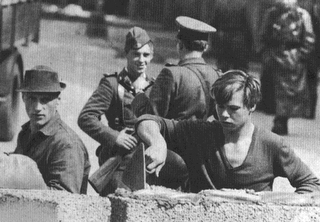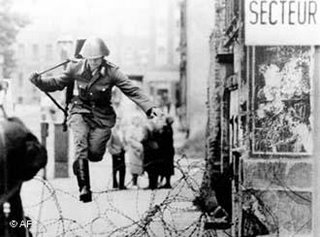 [Health warning: Not only is this posting not by Dr North but it is not about the Conservative Party Conference, an event I find so boring that I decided not to attend even the fringe meetings. A number of our readers will prefer to ignore it. Please do so.]
[Health warning: Not only is this posting not by Dr North but it is not about the Conservative Party Conference, an event I find so boring that I decided not to attend even the fringe meetings. A number of our readers will prefer to ignore it. Please do so.]Today is the 16th anniversary of the reunification of Germany. It is a holiday in the country but feelings about the event and its aftermath remain mixed, as Deutsche Welle reports.
Interestingly, the piece mentions that in his days as Chancellor, Gerhard Schröder tried to move the celebration to the nearest Sunday, hoping that at least one holiday of the many in the German economy will be abolished and, possibly, reunification day will die a death.
 He was, however, accused of being “unpatriotic” and of wanting to forget history (rather a complex issue in Germany, to which I shall return below. The holiday remained, though it is seen as just another day off work rather than anything significant.
He was, however, accused of being “unpatriotic” and of wanting to forget history (rather a complex issue in Germany, to which I shall return below. The holiday remained, though it is seen as just another day off work rather than anything significant. In a recent poll, 68 percent of Germans said the holiday was not a personal cause for celebration, while 80 percent said Oct. 3 should remain a national holiday.We have come a long way from those heady days when the wall was knocked down by real people power. The economic after-effects are still felt through the country but particularly in the eastern parts whence the flow of workers westwards continues.
According to the latest report on German unity, which the German government publishes annually before Oct. 3, Germany has invested more than 250 billion euros ($317 billion) in direct aid since 1990 in the so-called "new states" in former East Germany. A further 156 billion euros have been agreed upon for the period 2005-2019 as part of a comprehensive economic package known as "Solidarity Pact II."The figures are spectacular, especially if one compares them to the rather more controlled amounts that the EU had planned to “invest” in the ten new members (with two to come).).However, while all this has contributed to the severe economic problems the country as a whole is facing, the development of the eastern regions has not been as fast as Chancellor Kohl, for one, had predicted.
 According to Minister of Transportation, Building and Urban Development, Wolfgang Tiefensee, it will take another fifteen to twenty years for the east to catch up with the west. In the meantime, wages there remain 23 per cent lower than in the west but this does not attract investment since it is assumed, possibly on good evidence, that old East German working habits (they pretend to pay and we pretend to work) have taken deep roots. Unemployment is twice as high as in the west and would be even higher if there were no movement of workers to the western regions.
According to Minister of Transportation, Building and Urban Development, Wolfgang Tiefensee, it will take another fifteen to twenty years for the east to catch up with the west. In the meantime, wages there remain 23 per cent lower than in the west but this does not attract investment since it is assumed, possibly on good evidence, that old East German working habits (they pretend to pay and we pretend to work) have taken deep roots. Unemployment is twice as high as in the west and would be even higher if there were no movement of workers to the western regions.Politically the results have been mixed but, surely, not too bad. Democracy in West Germany turned out to be strong enough to withstand the shock of reunification and to overcome those problems. By and large, the system has spread to the former DDR with some success and the country now has a Chancellor who is an ossie.
Ironically, this is rather bad news for the European Union as its ideology is firmly based on the evilness of nationalism and, in particular, nationalism in Germany. As expected, younger generations of Germans do not see the need for constant guilt and breast-beating for something that even their grandparents cannot be faulted for. (The parents of those in their twenties were born after the war or at the very end of it and their parents, in turn, would not have been much more than young soldiers or members of Hitler Jugend.)
With Germany a firmly established democracy it becomes very difficult to convince anyone that even that country’s national feelings are a danger to. As it happens, the enemy we are facing now has tried to attack us on that level. It is not just the bombs that are dangerous but the screaming demands that we, Westerners, should abandon our ideas and submit to a completely alien culture. The only way we can fight that is by asserting loudly and strongly our own identity. But the only identity that can matter to people is their national one, hard to define but usually clear to see when it is there. The European Union has weakened the European countries by its project of destroying national identity.
One has to remember, also, that East Germany developed very differently in the forty years after the war. In the first place, there were no demands that East Germans expiate the crimes of Nazism. A number of Nazis, at all levels, were employed by the new regime, whose institutions and standards of behaviour were not all that different and who found the knowledge and experience of the old SS very useful.
On a wider front, it became a given of East German politics that miraculously the citizens of the people’s paradise had escaped the vileness of the Nazi regime. Not our fault, mate, they proclaimed loudly. It is not surprising that the extreme right-wing groups are more prominent in the east of the country. How could it be otherwise? Nobody there was brought up to feel guilty about fascism or nazism.
They were, on the other hand, brought up to feel proud of being communist, even if everyone knew that a wall had to be built across Berlin and barbed wire across Germany to keep the people in. Unlike other walls, this one was not for self-protection.
So we come to another problem. If West Germany has had to beat its collective breast all these years because of the 12 horror-filled years how is it that East Germany has not had to feel guilty either for those years or for the subsequent 40 that had their own share of horrors. Whichever way one looks at it, Germans are asking all sorts of awkward questions and these may not enhance their support for the great European project, a support that was always taken for granted.
COMMENT THREAD
